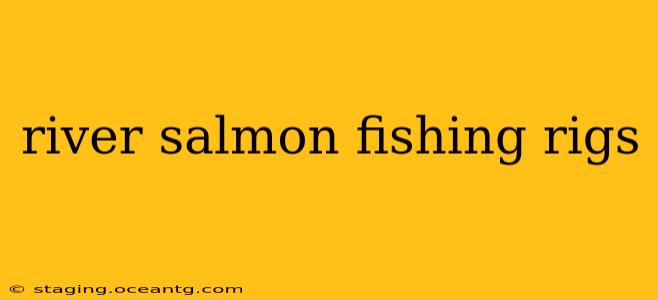Salmon fishing in rivers demands specialized techniques and equipment. Choosing the right rig is crucial for success, as it directly impacts your ability to present the lure effectively and hook these powerful fish. This guide explores various river salmon fishing rigs, their strengths, weaknesses, and optimal applications. We'll also address common questions anglers have about selecting the best rig for the job.
What are the best rigs for river salmon fishing?
The "best" rig depends heavily on several factors, including the river's current speed, the type of salmon you're targeting (e.g., Chinook, Coho, Atlantic), the depth of the water, and the type of lure you're using. However, several rigs consistently prove effective. These include:
-
The Simple Float Rig: This classic rig involves a float, a weight (usually a split shot or small bullet weight), a swivel, and your lure. The float allows you to control the depth of your lure, which is crucial in rivers where salmon may hold at specific depths. Adjust the weight and float size to manage the depth and drift rate. This is ideal for slower-moving rivers and smaller lures like spinners or spoons.
-
The Weighted Leader Rig: This rig uses a heavier weight (such as a sinker) directly above the lure to get your offering down deep quickly in faster currents. The leader is typically a longer length of monofilament or fluorocarbon line, adding sensitivity and allowing the lure to move more naturally. This is better for deeper pools and faster water.
-
The Tandem Rig: This setup involves two lures, typically a spinner and a fly or a smaller spoon, rigged in tandem on a single line. The additional lure creates more attraction, especially when salmon are less active. Use this in areas with a moderate current and some structure.
-
The Carolina Rig: Though primarily used for bass fishing, an adapted Carolina Rig can be surprisingly effective for river salmon, particularly in deeper pools with slower current. It features a weight (often a bullet weight) on the main line, above a swivel, followed by a leader with your lure. This keeps your lure off the bottom and allows it to drift naturally, triggering strikes.
What type of weight should I use for river salmon fishing?
Weight selection depends entirely on the river's current. In slower-moving sections, lighter weights like split shot or small bullet weights suffice. Faster currents require heavier weights—think heavier bullet weights or even egg sinkers—to keep your lure in the strike zone. Remember to use weights that are heavy enough to maintain contact with the bottom (if bottom bouncing) or to control the lure's depth effectively without over-powering the action of your lure. Experimentation is key!
What size hooks should I use for river salmon fishing?
Hook size depends on the size of the lure and the size of the salmon you are targeting. For smaller lures and smaller salmon, smaller hooks (size 2-6) are appropriate. Larger lures and larger salmon require larger hooks (size 1/0-4/0). Strong, sharp hooks are essential to ensure good hooksets.
What kind of line is best for river salmon fishing?
Braided line offers excellent sensitivity and strength but can be harder to manage in snaggy rivers. Monofilament line is more forgiving and less prone to tangles, but it lacks the sensitivity of braid. Fluorocarbon line offers a good compromise, with better abrasion resistance and lower visibility than monofilament. The choice depends on your personal preference and the specific conditions of the river.
What are some tips for successful river salmon fishing?
-
Know your river: Understanding the river's flow, depth, and structure is vital for choosing the right rig and fishing effectively.
-
Use quality gear: Invest in durable rods, reels, and lines specifically designed for salmon fishing.
-
Learn to read the water: Observe the water's movement and look for signs of salmon, such as disturbances on the surface or holding areas.
-
Experiment with different rigs and lures: Find what works best in your specific location and conditions.
-
Practice your casting: Accurate casting is essential for effectively presenting your lure.
-
Be patient: Salmon fishing can require time and patience.
By understanding these principles and adapting your techniques to different river conditions, you can greatly increase your chances of a successful river salmon fishing trip. Remember, safety should always be a priority. Always check local fishing regulations and be mindful of your surroundings.
